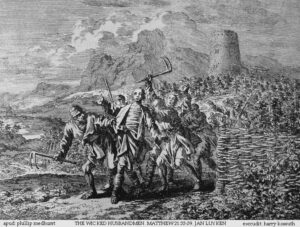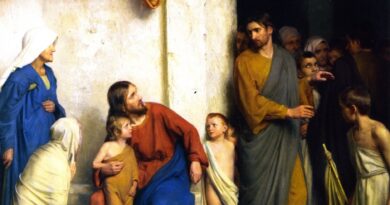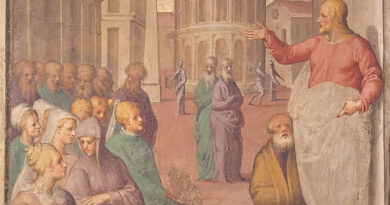XXVII Sunday of Ordinary Time/A
Massimo Palombella

In today’s Gospel (Mt 21:33-43) Jesus once again returns to a parable that has the vineyard as its characteristic element. Today the vineyard is rented out to farmers so that they “produce fruit”. In this dynamic, it is interesting to note that the aforementioned farmers are not concerned with ‘producing fruit’ but with having the inheritance. In essence, their attention is focused on having, on possessing something but without taking the right path, the correct process that leads to ‘producing fruit’, and thus to ‘possessing’ in a healthy way. Jesus’ focus is, on the other hand, on ‘producing fruit’, and this is the essential task of our lives. In all of us, however, there is often the subtle temptation that ‘producing fruit’ means accomplishment, occupying positions of responsibility, ‘getting ahead’, earning money… Essentially identifying ‘bearing fruit’ with something external to us. To ‘produce fruit’ in our lives, according to the above-mentioned focus of Jesus, it is necessary to ‘move the earth’, i.e., to encounter our weakness, our ‘not being able’, to dissolve the lumps, to make the necessary separations, to learn to trust, to become capable of walking even without certainties, to accept the risk of making mistakes… In essence, to truly live and in reality.
The Offertory antiphon of today’s celebration is taken from the first chapter of Job’s book with the following text:
“Vir erat in terra Hus nomine Job
simplex et rectus ac timens Deum:
quem Satan petiit ut tentaret,
et data est ei potestas a Domino
in facultates, et in carnem ejus:
perdiditque omnem substantiam ipsius et filios:
carnem quoque ejus gravi ulcere vulneravit.”
There was a man in the land of Hus whose name was Job,
a blameless, upright and God-fearing man;
Satan asked to be allowed to tempt him,
and the Lord gave him power
over his possessions and his body;
and so, he destroyed his possessions and his children,
and he ravaged his flesh with horrible sores).
The attached music, in Gregorian Chant, is taken from the Gradual Triplex published in Solesmes in 1979. The interpretation is by the Stepping Stone Chant Project.
A blessed Sunday and heartfelt greetings.


